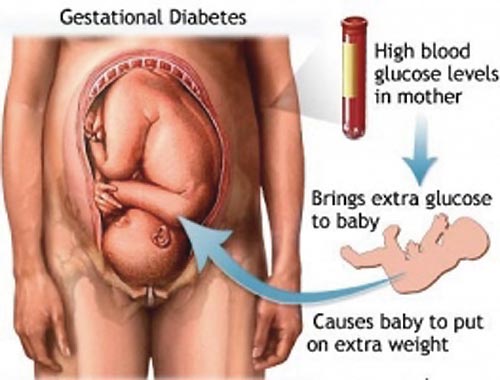Gestational Diabetes

Published: 18 Jun 2025
ICD9: 648.00 ICD10: O24.319 ICD11: JA63.2
Gestational diabetes is a type of diabetes that develops during pregnancy in women who didn't have diabetes before.
It's characterized by high blood sugar levels that can affect your pregnancy and your baby's health.
Here's a breakdown:
![]() Who it affects: Pregnant women who did not have diabetes prior to pregnancy.
Who it affects: Pregnant women who did not have diabetes prior to pregnancy.
![]() When it develops: Usually during the second or third trimester.
When it develops: Usually during the second or third trimester.
![]() Cause: Hormones produced during pregnancy can make it harder for the body to use insulin effectively. Insulin is a hormone that helps glucose (sugar) from food get into cells for energy. When insulin can't do its job well, glucose builds up in the blood, leading to high blood sugar levels.
Cause: Hormones produced during pregnancy can make it harder for the body to use insulin effectively. Insulin is a hormone that helps glucose (sugar) from food get into cells for energy. When insulin can't do its job well, glucose builds up in the blood, leading to high blood sugar levels.
![]() Symptoms: Often, there are no noticeable symptoms. That's why screening for gestational diabetes is a routine part of prenatal care. Some women might experience increased thirst, frequent urination, fatigue, or blurry vision, but these can also be common symptoms of pregnancy itself.
Symptoms: Often, there are no noticeable symptoms. That's why screening for gestational diabetes is a routine part of prenatal care. Some women might experience increased thirst, frequent urination, fatigue, or blurry vision, but these can also be common symptoms of pregnancy itself.
![]() Diagnosis: Typically diagnosed through a glucose screening test and/or a glucose tolerance test performed between 24 and 28 weeks of pregnancy.
Diagnosis: Typically diagnosed through a glucose screening test and/or a glucose tolerance test performed between 24 and 28 weeks of pregnancy.
![]() Treatment: Usually involves managing blood sugar levels through diet and exercise. Some women may also need to take insulin or other medications.
Treatment: Usually involves managing blood sugar levels through diet and exercise. Some women may also need to take insulin or other medications.
![]() Risk to the baby: Uncontrolled gestational diabetes can lead to:
Risk to the baby: Uncontrolled gestational diabetes can lead to:![]()

![]() Macrosomia: A larger-than-average baby, which can make delivery more difficult and increase the risk of birth injuries.
Macrosomia: A larger-than-average baby, which can make delivery more difficult and increase the risk of birth injuries.![]()

![]() Hypoglycemia: Low blood sugar in the baby after birth.
Hypoglycemia: Low blood sugar in the baby after birth.![]()

![]() Breathing problems: Increased risk of respiratory distress syndrome.
Breathing problems: Increased risk of respiratory distress syndrome.![]()

![]() Jaundice: Yellowing of the skin and eyes.
Jaundice: Yellowing of the skin and eyes.![]()

![]() Increased risk of obesity and type 2 diabetes later in life.
Increased risk of obesity and type 2 diabetes later in life.![]()

![]() In rare cases, stillbirth.
In rare cases, stillbirth.
![]() Risk to the mother:
Risk to the mother:![]()

![]() Preeclampsia: High blood pressure and protein in the urine.
Preeclampsia: High blood pressure and protein in the urine.![]()

![]() Increased risk of cesarean delivery.
Increased risk of cesarean delivery.![]()

![]() Increased risk of developing type 2 diabetes later in life.
Increased risk of developing type 2 diabetes later in life.
![]() After pregnancy: In most cases, gestational diabetes goes away after delivery. However, women who have had gestational diabetes have a higher risk of developing type 2 diabetes later in life and should be screened regularly.
After pregnancy: In most cases, gestational diabetes goes away after delivery. However, women who have had gestational diabetes have a higher risk of developing type 2 diabetes later in life and should be screened regularly.
![]() Prevention: While you can't always prevent gestational diabetes, maintaining a healthy weight, eating a balanced diet, and getting regular exercise before and during pregnancy can help reduce your risk.
Prevention: While you can't always prevent gestational diabetes, maintaining a healthy weight, eating a balanced diet, and getting regular exercise before and during pregnancy can help reduce your risk.
It's important to note that gestational diabetes is manageable with proper medical care and monitoring. Early diagnosis and treatment can significantly reduce the risks to both the mother and the baby. If you're pregnant or planning to become pregnant, talk to your doctor about your risk factors and what you can do to stay healthy.